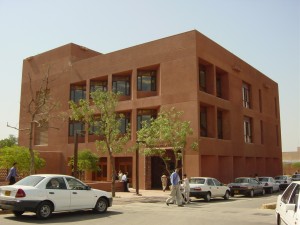 Giving back to the community and helping those less fortunate, have been hallmarks of Altaf Nazerali’s life. He was raised in the Ismaili faith, a sect of Shia Islam and still practices the family’s tradition of community service which dates back to the early 1900s when his grandfather helped establish a school in Moshi, Tanzania
Giving back to the community and helping those less fortunate, have been hallmarks of Altaf Nazerali’s life. He was raised in the Ismaili faith, a sect of Shia Islam and still practices the family’s tradition of community service which dates back to the early 1900s when his grandfather helped establish a school in Moshi, Tanzania
In the mid 1980s, the family became significant patrons of a boarding school for vocational training of girls in Bhuj, India from where the family originated before migrating to Africa in the early part of the 20th century. This region is one of the most deprived areas of India. The school which has boarding facilities attracts female students from several villages within the region, and provides primary and secondary education in addition to vocational training.
The philosophy behind the school is that educated women will then educate their children, and by having marketable skills provide additional income to their families thus improving the quality of lives.
Perhaps Altaf Nazerali’s most significant contribution came in 2002 when he and his family donated the Nazerali-Walji Building for ambulatory care services at the Aga Khan University Hospital Complex – Pakistan’s leading Medical Institution and teaching facility.
This dedicated 25,000 square foot ambulatory care building includes a nuclear medicine suite and custom designed rooms for tuberculosis patients. State-of-the-art I.T. / telemetry, and nurse call systems are also part of the project.
Then Governor Somroo was on hand for the dedication ceremony. In his address, Governor Somroo described the facilities as impressive for both the donations provided and also the confidence this University evoked among national and international donors. He was quoted as saying to Altaf Nazerali, “Indeed your gift will benefit many needy and deserving patients.”
The inauguration of the Nazerali-Walji Building represented an important step by the University towards meeting the growing demand for quality health care services in Pakistan. The three-storied US$ 4.8 million ambulatory care building provides outpatients with an easily accessible and comprehensive multipurpose facility — clinics, diagnostics and pharmacy services all under one roof.
Cardiology, cardiac surgery, endocrinology, pulmonology services and Executive Clinics are offered. The design of the Nazerali-Walji Building also provides room for future expansion as needs dictate. The first two floors of the building include 31 examination rooms, nursing stations and auxiliary facilities such as teaching areas, procedure and assessment rooms, and support spaces. Outpatient cardio-pulmonary diagnostic service, nuclear imaging, a phlebotomy station, and a radiology room are all located on the ground floor. Additionally, there is a pharmacy outlet and patient business and welfare offices. The building’s design blends with the surrounding landscape, complementing the contextual architectural parameters of the University campus.
Executive Clinic
In Pakistan, often minor fleeting complaints, seemingly insignificant, are frequently ignored as there are few places to go for a routine exam and check up. Patients now have access to routine exams at the Executive Clinic located in the Nazerali-Walji building The major benefit of the health evaluation program at the Executive Clinic is letting patients know about the status of their current health and provide proactive and preventative information on many topics including the dos and don’ts. During the examination, potential problems can be detected and treated in the early stages before they become large difficult to treat health issues. If necessary, patients are referred and appointments arranged with specialists.
The family supports many other charitable institutions in the United States and Canada which are focused on improving health care, and education in economically deprived areas of the world specifically in Africa and Asia.
Rotary International named Mr. Nazerali as a Paul Harris fellow several years ago in recognition of his charitable work.
